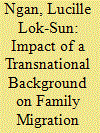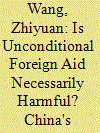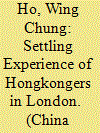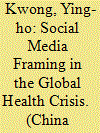|
|
|
Sort Order |
|
|
|
Items / Page
|
|
|
|
|
|
|
| Srl | Item |
| 1 |
ID:
192214


|
|
|
| 2 |
ID:
192210


|
|
|
|
|
| Summary/Abstract |
Anti-China sentiments have been sharply rising across the globe in the past decade. Although concepts such as the "Thucydides Trap" and "China threat" are often used to interpret them, "anti-China populism" becomes an increasingly adopted interpretation. Nonetheless, current discussions of anti-China populism are cursory; they have not empirically substantiated that anti-China sentiments are populist. They also pay little attention to formal theoretical definitions of populism. This study helps fill the research gap by evaluating whether populism is an empirically tenable interpretation of anti-China sentiments. This evaluation is operationalized based on current populism theories and studies on "measuring populism." This study's empirical case is one of the earliest instances of anti-China sentiments: Hong Kong localism. The main dataset is composed of multiple rounds of in-depth interviews with 23 main informants. The supplementary dataset contains a variety of documentary sources that reflect the political stance of Hong Kong localists.
|
|
|
|
|
|
|
|
|
|
|
|
|
|
|
|
| 3 |
ID:
192215


|
|
|
| 4 |
ID:
192209


|
|
|
|
|
| Summary/Abstract |
Due to its economic and political implications, the growth of Chinese investment in Chile has generated wide interest among domestic elites. Despite being Chile's main trading partner, until 2016 direct Chinese investment in the country had been almost non-existent. Its growth since then raises questions about how Chileans perceive China. This paper seeks to examine how Chilean elites characterize and evaluate the increasing presence in the country of Chinese capital. It argues that different categories of local elites (economic, political and academic) have opposing views on the matter. To test this hypothesis, a qualitative study of elite opinion was conducted in which the characteristics and the explanatory depth of elites' perception of China were analyzed. Overall, it is apparent that the Chilean elite has a positive perception of China. It seems that a consensus has emerged amongst stakeholders that the Asian nation represents a good opportunity for the Chilean economy. However, when the analysis focuses on different categories of domestic elites, nuances are observed and there is an evident lack of unanimity regarding the Chinese presence in the country. The results suggest that domestic stakeholders blame each other for the absence of a strategy towards a nation that is increasingly relevant in domestic politics.
|
|
|
|
|
|
|
|
|
|
|
|
|
|
|
|
| 5 |
ID:
192212


|
|
|
|
|
| Summary/Abstract |
Recent media and some published studies have strongly linked the recent wave of emigration from Hong Kong to the changing political conditions caused by the Anti-Extradition Law Amendment Bill movement and the enactment of the National Security Law. This article departs from that narrative to shed light on an alternative reality involving a segment of Hong Kong residents with privileged transnational mobility. Through in-depth interviews with 41 second-generation returnees from immigrant receiving countries of Canada, Australia, the U.S., the U.K., this study finds that concerns over political uncertainty were not the main driver prompting these returnees to consider (re) migrating to their former host countries. Second-generation returnees are a unique group of Hong Kong residents who possess dual citizenship and can migrate with ease, a privilege provided by their parents who emigrated with them before 1997 in times of uncertain political change. Combined with their complex transnational sense of belonging, second-generation returnees were rather detached in their assessment of the precarious political situation in Hong Kong. Instead, parenthood priorities, particularly their concerns over the character of local education and affordability of international education in Hong Kong, not only overshadowed political concerns but also overrode the likely cost to their careers of relocating to the West. By paying attention to the impact of the transnational background of second-generation returnees, this article also underscores the importance of the life course perspective that considers the long-term implications of migration for family members across later generations when understanding contemporary Chinese migration processes.
|
|
|
|
|
|
|
|
|
|
|
|
|
|
|
|
| 6 |
ID:
192207


|
|
|
|
|
| Summary/Abstract |
In China, the government's crackdowns on dog owners can be traced back to 1949 when owning a pet dog in cities was viewed as a bourgeois affectation. Despite some softening of attitudes towards dogs in recent years, authorities still regard them primarily as noise polluters and potential disease carriers. Consequently, cities throughout China have implemented multiple rounds of clampdowns on dogs. These anti-dog movements have resulted in the indiscriminate killing of countless dogs, both stray and domesticated. This study examines the evolution of dog-control policies and the campaigns in China, shedding light on the current living conditions of dogs in the country and social attitudes towards "man's best friend."
|
|
|
|
|
|
|
|
|
|
|
|
|
|
|
|
| 7 |
ID:
192208


|
|
|
|
|
| Summary/Abstract |
This article evaluates how China's foreign aid affects human rights in Africa. Using the fixed effects model to analyze a data set on China's aid from 2000 to 2013, this research finds: (1) in the African recipient states China's aid exhibits virtually no negative and statistically significant impact on physical integrity rights, (2) it does not discourage conditional aid inflows, and (3) it fails to offset the positive human rights effects of conditional aid. The findings are robust to various econometric estimators, alternative model specifications, and multiple human rights measures. Overall, China's aid shows no sign of systemically weakening basic human rights protection in Africa.
|
|
|
|
|
|
|
|
|
|
|
|
|
|
|
|
| 8 |
ID:
192213


|
|
|
|
|
| Summary/Abstract |
The fear of losing one's original way of life has triggered an exodus of Hongkongers in the early 2020s, who saw Beijing's increasing crack down on civil liberties of its most economic vibrant Special Administrative Region. The majority of these migrants will leave for the U.K. as the British government has offered its former colony an easy emigration pathway since January 2021. This article first examines the contextual and theoretical backdrop of the current reluctant migration in comparison with the other outbound migration that the city witnessed three decades ago in fear of its handover to China in 1997. Then, the discussion focuses on the post-migration lives of dozens of Hongkongers who have been newly settled in London for 8–12 months during 2021–22. Based on participant observation and ethnographic interviews, empirical findings reveal the informants' unique experiences regarding their migratory process, livelihood strategies, and nostalgia for Hong Kong. Theoretical and political implications of the current case of reluctant migration are highlighted.
|
|
|
|
|
|
|
|
|
|
|
|
|
|
|
|
| 9 |
ID:
192206


|
|
|
|
|
| Summary/Abstract |
To mitigate the COVID-19 pandemic many countries have adopted mandatory social distancing measures, but in China, social distancing was implemented only as an advisory guideline. This article seeks to understand whether, and why Chinese citizens adhered to such social distancing advice. The data, derived from a survey in the 2020 local outbreak in Beijing, show that voluntary compliance was hardly influenced by motivational predictors, but was almost exclusively dependent on a single, key situational predictor, namely people's practical capacity to follow social distancing. These findings demonstrate that the emphasis on intrinsic and extrinsic motivations in existing compliance research does not do justice to the situational nature of voluntary compliance observed within this particular context. We discuss theoretical implications of these findings for the compliance literature. Moreover, we use these findings to provide (tentative) insight into the compliance challenges that China was facing during the course of the pandemic, and to speculate about ways in which compliance may be enhanced during future pandemic outbreaks in China.
|
|
|
|
|
|
|
|
|
|
|
|
|
|
|
|
| 10 |
ID:
192211


|
|
|
|
|
| Summary/Abstract |
Social media depiction of crises can mobilize people's support for or dissatisfaction with the government. By analyzing 3,799 videos, this study compares how pro-democracy and pro-regime opinion leaders framed the COVID-19 pandemic in Hong Kong. The results reveal that pro-democracy opinion leaders placed the primary blame for the crisis on the misadministration of the Hong Kong Special Administrative Region authorities, followed by attributing responsibilities to the Chinese authorities, and then suggesting opportunities for foreign penalties to be imposed on China. Pro-regime opinion leaders mostly criticize the opposition, denounce foreign countries, and seek to garner support for China. The conclusion strongly supports the thesis that opinion leaders and users from both camps actively engage with negatively framed content rather than positively framed content. Specifically, videos that frame foreign pressure on China demonstrate statistically significant explanatory power in relation to the engagement of prodemocracy users, while videos denouncing pro-democracy figures exhibit statistically significant explanatory power in regard to the engagement of pro-regime users. This article explores which negative topics can stimulate the audience's engagement and it compares the significant variations in framing strategies employed by either of the opposing factions when targeting their opponents. The case of Hong Kong illustrates how social media framing contributes to the emergence of "political extremism" in a polarized society.
|
|
|
|
|
|
|
|
|
|
|
|
|
|
|
|
| 11 |
ID:
192205


|
|
|
|
|
| Summary/Abstract |
By examining the case of rural Guangdong, this research elaborates on the practice of party-led social capital building (PSCB), which provides a Janus-faced mechanism for creating synergies between the local party-state and society: the Primary Party Organizations cultivate bonding, bridging, and linking social capital to enhance community engagement while deliberately limiting the democratizing potential of this process by selecting vetted nonstate actors, including social workers, private entrepreneurs, and official delegates from higher administrative levels, to serve as key nodes in the community networks. These delegates are tasked with gathering information, building trust and reciprocity, and influencing public opinion to ensure that mass participation in community affairs produces the results desired by the local party-state. The state-vetted key players are mobilized and controlled by the grassroots cadres through well-targeted actions, including party discipline and various carrot-and-stick incentives in the private and tertiary sectors. Reinvigorating the mass line by integrating party-building with the control of the nonstate sector, grid management, and cultural governance, PSCB calls for our reimagination of the governance nexus in grassroots China.
|
|
|
|
|
|
|
|
|
|
|
|
|
|
|
|
|
|
|
|
|